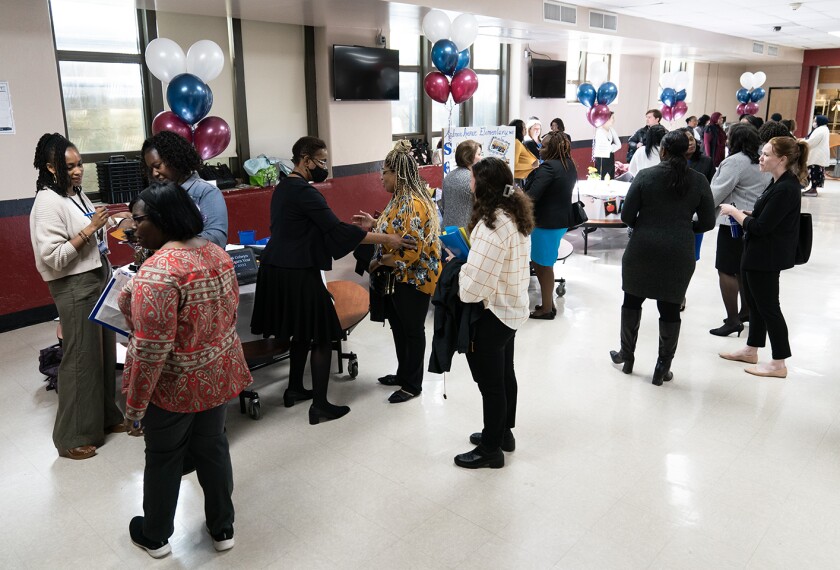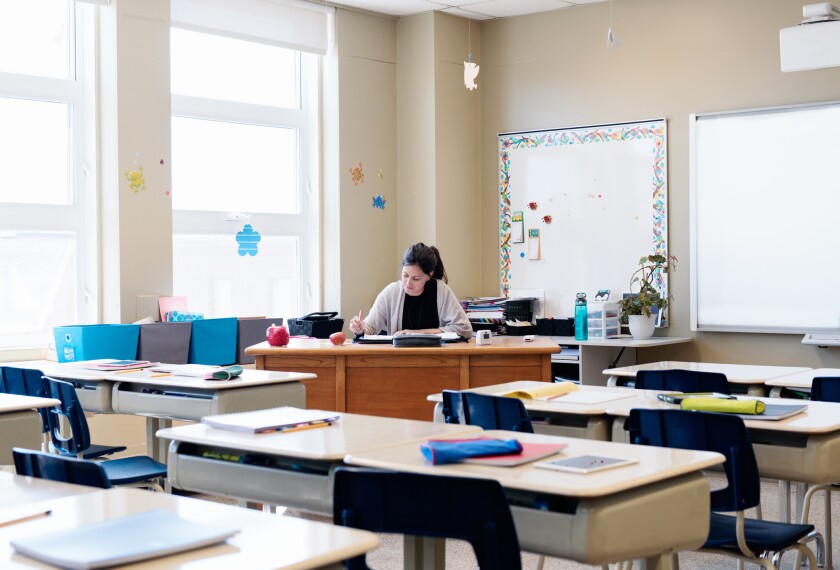Third graders in Maryland who don’t read on grade level by the end of the school year may find themselves repeating the grade.
Maryland’s department of education is considering enacting a statewide early literacy grade-retention policy. If it is approved, Maryland will join a growing number of states with similar policies: As of 2022, 25 states and the District of Columbia had implemented 3rd grade retention policies, up from 13 states in 2013, according to the National Council of State Legislatures.
The practice of 3rd grade retention has trended upwards in recent years, but the research on the practice is complex, and it has been criticized by education experts who argue that such policies are ineffective over the long term.
While much of the backlash around these policies has focused on the act of retention itself, less attention has been paid to the actual timing of it—at the end of 3rd grade: Why do these early literacy retention policies overwhelmingly focus on the end of 3rd grade? Is this target of when kids should know how to read warranted?
Here’s what development and education experts had to say.
Data collection plays big role in retention policies
When asked why retention policies target 3rd graders, multiple experts said it’s due in large part simply to when districts collect students’ data on how well they can read.
For one thing, that’s the year that states must begin annually assessing students’ reading under the Elementary and Secondary Education Act.
“Schools don’t have good data before 3rd grade, so it can be a much more complicated decision before then,” said Rebecca Kockler, executive director of Reading Reimagined, a program that’s part of the education research nonprofit Advanced Education Research and Development Fund.
Former Baltimore City 1st grade teacher Jarrod Bolte agreed.
“Third grade is the first time that there is an indicator that kids are on grade level or off grade level based on a common metric that is applied across the state. I think that’s why you’re getting all of those [retention] policies,” said Bolte, who is now the CEO of Improving Education, a nonprofit that aims to improve educational systems.
Kockler said while many districts don’t have access to “externally validated” student data in 1st and 2nd grade, that’s changing.
“There are a couple of assessments coming into the market earlier, and we think that’s a good thing,” she said.
Earlier indicators may predict reading challenges
Bolte suggests that educators shouldn’t have to wait until 3rd grade to recognize when students have fallen behind. Kindergarten readiness assessments measure skills that are highly predictive of 3rd grade outcomes, and about half of all states use them, Bolte said.
“We actually have indicators way back when kids are as young as 4 or 5 years old of those who might not make it,” he said.
Bolte points to a 2023 report conducted by the Baltimore Education Research Consortium at Johns Hopkins University that analyzed the kindergarten readiness of six student cohorts in the Baltimore city school district, from the 2016-17 to the 2021–22 school years. The study found a strong relationship between kindergarten readiness and 3rd grade outcomes.
“We don’t have to wait for kids to fail. We can actually make sure that they’re hitting these targets earlier through this entire trajectory,” Bolte said.
A cognitive neuroscientist marvels at students’ ability to read by 3rd grade
Cognitive neuroscientist Tzipi Horowitz-Kraus marvels at people’s ability to learn to read—period.
“Evolutionarily, the brain was not created to read. To learn how, the brain utilized different brain regions and networks originally created to do other things—visually, auditory, cognitive control and attention, and motor skills,” said Horowitz-Kraus, an associate professor in the neuropsychology department at the Kennedy Krieger Institute and in the psychiatry and behavioral sciences department at the Johns Hopkins School of Medicine.
With typical development and the right exposure to literacy that includes oral storytelling and sound literacy instruction, most kids are able to read accurately by the end of 3rd grade, Horowitz-Kraus explains. For those who struggle, potential reasons include neurological issues like attention-deficit/hyperactivity disorder, or ADHD, and dyslexia, or environmental factors, such as stress, lack of exposure to literacy at home, or overuse of screens.
Repeating 3rd grade without modifying those factors or the instruction students receive won’t remedy the problem, Horowitz-Kraus said.
“Aside from saying, ‘we have a reading problem,’ we need to understand why—and what the most appropriate intervention is,” she said.
Data on retention policies show mixed results
Research on retention policies like the one proposed by Maryland’s board of education—whose draft states that “each student’s progression from one grade to another be determined, in part, upon proficiency in reading”—have shown mixed results. But no two such policies are alike.
The policy currently under consideration in Maryland includes several components beyond grade retention—such as a “system of support” for all kindergarten through 3rd grade teachers, professional learning requirements on the science of reading and related assessments, and guidelines on requesting exemptions for student retention, among other things.
Florida, which implemented its 3rd grade retention policy in 2002-03, helped spur other states to follow suit, bolstered by reports from major advocacy organizations like the Annie E. Casey Foundation. But a body of recent research on the effects shows mixed findings.
One study that tracked the initial effects of Florida’s retention policy found significant improvement in reading achievement for the first two years. By years five and six, however, the advancements proved statistically insignificant.
A body of more recent research seems to suggest that a key difference that can make retention more effective is providing those students who are held back with additional supports, and access to teaching shaped by evidence-based literacy methods.
Some literacy experts want to see more emphasis on teachers’ preparedness in the early grades to teach literacy instead.
“To me, this is about: Are our teachers being trained to succeed in kindergarten through 2nd and 3rd grade? Are school systems using instructional resources based on research?” said Reading Reimagined’s Kockler.
Kockler agrees that retaining individual students at the end of 3rd grade without meaningful changes in instruction and support will not reap benefits. She also questions why so many students—not just those being retained—struggle to read proficiently. It’s a question many literacy experts raise, especially given the increasing interest in evidence-based literacy instruction in a growing number of states.
“We know that every kid can learn to read unless they have a very severe disability, and that’s a tiny percentage of kids,” said Kockler. “The burden is on our system to figure out why 70 percent of kids aren’t reading on grade level.”
Disclaimer: The copyright of this article belongs to the original author. Reposting this article is solely for the purpose of information dissemination and does not constitute any investment advice. If there is any infringement, please contact us immediately. We will make corrections or deletions as necessary. Thank you.





